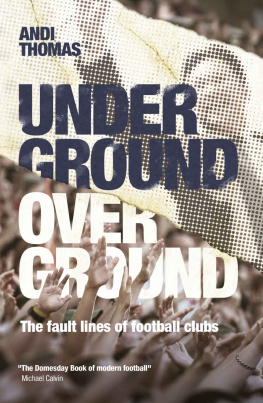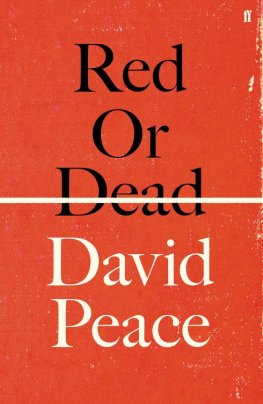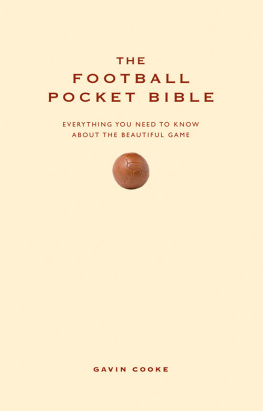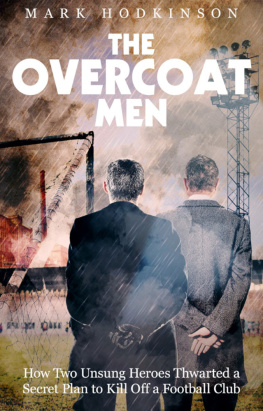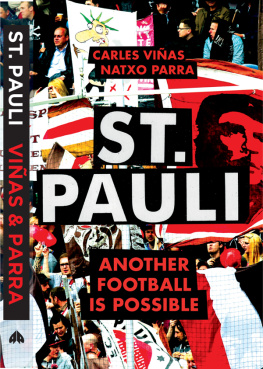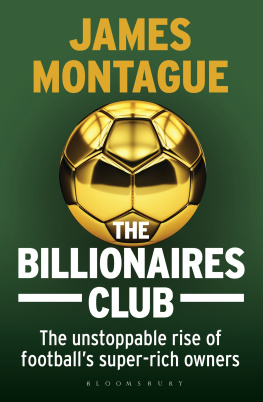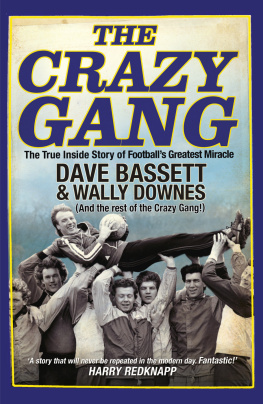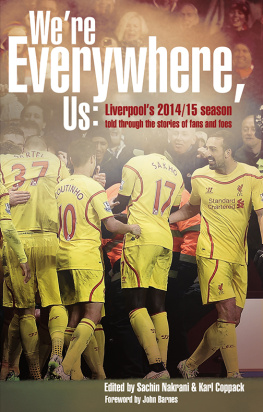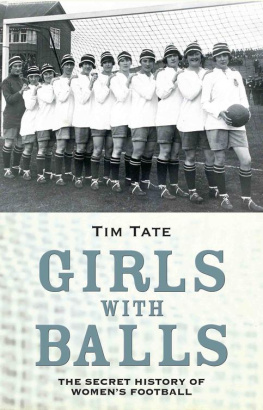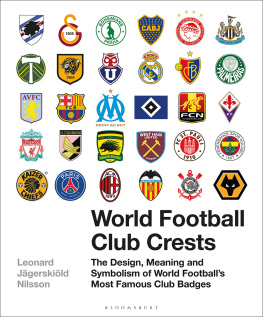Thank you to Dr. Gavin Weston and Frdric Carver.
Thank you to Mike Counsell, Juliet Jacques, Greg Johnson, Scott Oliver and Charlie Talbot.
Thank you to Adam and Rob at Halcyon.
Thank you to the Old Kings Head and all who sail in her.
Thank you to everybody that answered my questions, filled out my surveys, lent me their thoughts, shared their work, wrote books that I borrowed things from, helped me dig out documents, and listened tolerantly and with great patience as I worked all of this out.
Thank you to Trudy. Thank you to Rosa.
Introduction
What is a football club?
This is an easy question with an obvious answer. If youre reading this, chances are you have a favourite one. Perhaps you go to their ground every week or so and watch them play; perhaps you do so occasionally, or not at all. But even if you dont have a club to call your own, youll know that a football club is, roughly speaking, a group of people that work together to make a football match happen by providing one of the two teams required. Small, amateur clubs do so for the pleasures of their members; large, professional ones sell t-shirts.
The easy answer is no doubt fine, as far as it goes, but in a very important sense it fails to go far enough. Leaving aside the amateur clubs: why, if this is all that football clubs are, are they supported? Why are they supported in such grand and overwhelming ways? Youll Never Walk Alone has accompanied couples down the aisle and coffins into the flames. Children are named for footballers, arms are inked with badges, faces, trophies, important dates. Memories are tethered to footballing moments and lives are measured out against them. Football grounds shape and even dominate cities: the largest of them hunch against the urban skyline like cathedrals, floodlight-spires jagging into the air.
Perhaps we might think about other things that football clubs resemble, other institutions of social importance. Stare at any given football club for long enough and some familiar shapes will emerge. Theres a bit of a parish church in there, and a bit of a community centre. Theres a lifestyle brand, and a theatre for both pantomime and drama, and a museum, and a pub, and a social club and a reading group and a choir and a comedy improv troupe and an argument lots of arguments and maybe even a bit of a folk tale as well. History, society and culture, comedy and tragedy. All stitched together into this strange chimera: a football club. And, of course, while all football clubs are fundamentally quite similar, each football club is distinct from every other in important and particular ways, like a large and uncommonly exciting bag of Revels.
Another question. Who do football clubs belong to? When it comes to professional clubs, the legal entities belong to whoever has shelled out the money that the last owner was looking for, be that Roman Abramovich or Mike Ashley, the City Football Group or Manchester United plc. But this is an uncomfortably technical answer, correct and dispiriting: we can counter by suggesting that they also belong, in a far more powerful sense that probably wouldnt stand up in court, to their fans.
In the early years of the 21st century, something highly unusual happened to one of Englands football clubs. The owners of south London club Wimbledon FC were given permission to move the club some sixty-odd miles north, to the new town of Milton Keynes. For anybody unfamiliar with the story there will be more details later, but for now suffice it to say that this was exceptionally controversial. In response, and after their various protests had ultimately failed, a number of Wimbledon fans formed a new club, AFC Wimbledon.
Where once there had been one club, now there were two. One bore the name, the league position, and was essentially the same corporate and legal entity, just in a different place (although it wasnt too long before Wimbledon FC went bankrupt, entered administration and then re-emerged as MK Dons). Meanwhile, AFC were still located in south London, but had to play their games in a temporary home and were starting all over again as semi-professionals, near the bottom of English footballs sprawling pyramid.
This book is about the consequences of that move. Not the practical consequences for Wimbledon or MK Dons, but the consequences for English football in general, and the questions that the move forced English football to ask itself. And this was, truly, a matter for English football as a whole: one of the more interesting features of the story is that it quickly went beyond those fans directly involved and became a national concern, a national argument.
When I first started thinking seriously about writing something related to Wimbledon, I began from the following sketched- out question.
Isnt it strange that pretty much everybody thats interested in football, famously a game of opinions and frequently a game of extremely heated disagreements, agrees that what happened to Wimbledon was, in some sense, not right?
Obviously there are plenty of answers, caveats, counterpoints, and further questions to be asked from there at the very least, Pretty much everybody is probably an overstatement and you may even like to disagree with my entire premise. And thats fine. Say what you like about football, but having opinions is definitely a game of opinions. But after some refinement, I decided it would be reasonable to work outwards from three basic assumptions:
a significant number of football fans, perhaps even the majority, had and still have at least some problem with what happened to Wimbledon;
a significant number of that significant number were and are still actively appalled; and
neither 1 nor 2 applies to Wimbledon fans only.
Looking for an explanation to point in particular, I realised that while what happened to Wimbledon was obviously extraordinary in its final outcome, the broad dynamics behind the split were familiar, perhaps even commonplace. At heart, this is a story of a clubs owners messing around with a club to the great frustration and unhappiness of the fans, and that is a story that has been repeated over and over at every level of the game.
Newcastle United, Cardiff City, Hull City, Charlton Athletic, Blackpool, Manchester United, Dulwich Hamlet, Macclesfield Town, York City, Portsmouth the list goes on. In fact, it might be quicker to list those clubs whose fans have never been put through some manner of owner-instigated strife. As far as I can tell, thats none of them.

